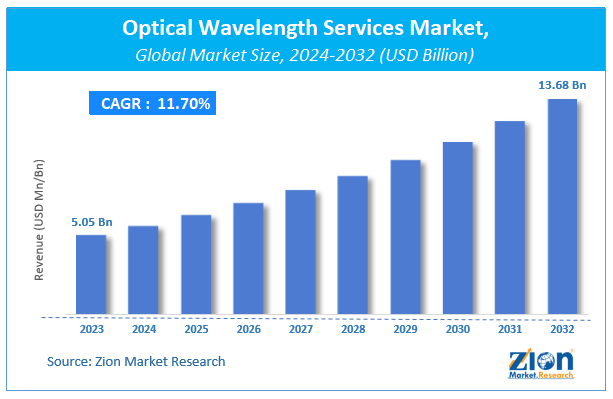Optical Wavelength Services Market Size, Share, Trends, Growth 2032

Optical Wavelength Services Market By Bandwidth (Less Than 10 Gbps, 40 Gbps, 100 Gbps, and More Than 100 Gbps), By Interface (Ethernet, OTN, and SONET), By Application (Metro, Long Haul, and Short Haul), and By Organization Size (Large Enterprises and SMEs): Global Industry Perspective, Comprehensive Analysis, and Forecast, 2024-2032
| Market Size in 2023 | Market Forecast in 2032 | CAGR (in %) | Base Year |
|---|---|---|---|
| USD 5.05 Billion | USD 13.68 Billion | 11.7% | 2023 |
Optical Wavelength Services Market Insights
According to a report from Zion Market Research, the global Optical Wavelength Services Market was valued at USD 5.05 Billion in 2023 and is projected to hit USD 13.68 Billion by 2032, with a compound annual growth rate (CAGR) of 11.7% during the forecast period 2024-2032.
This report explores market strengths, weakness, opportunities, and threats. It also provides valuable insights into the market's growth drivers, challenges, and the future prospects that may emerge in the Optical Wavelength Services Market industry over the next decade.
The report analyzes and forecasts the optical wavelength services market on a global and regional level. The study offers historical data from 2018 to 2022 along with a forecast from 2024 to 2032 based on revenue (USD Billion). The assessment of optical wavelength services market dynamics gives a brief thought about the drivers and restraints of the optical wavelength services market along with their impact on the demand over the years to come. Additionally, the report also includes the study of opportunities available in the optical wavelength services market on a global level.
Optical Wavelength Services Market: Growth Drivers
Optical wavelength refers to electromagnetic radiations; these wavelengths range between 100 nm and 1 mm. The term visible radiation and light (VIS) also refers to wavelengths that range anywhere between 400 nm and 800 nm and can be perceived by the human eyes. The rise in the transmission capacity is obtained by combining wavelengths of different light beams and then transmitting the resulting beams through a single optical fiber.
The global optical wavelength services market is driven by the rising bandwidth demand and connectivity between data centers, which allow them to exchange date at a very high speed along with increasing productivity. Moreover, the increasing adoption for 4K display has escalated the demand for high video contents, which is also propelling the optical wavelength services market. Furthermore, the surging demand for smartphones with a 4K display is also supporting the optical wavelength services market.
The report gives a transparent view of the optical wavelength services market. We have included a detailed competitive scenario and portfolio of leading vendors operating in the optical wavelength services market. To understand the competitive landscape in the optical wavelength services market, an analysis of Porter’s Five Forces model for the optical wavelength services market has also been included. The study encompasses a market attractiveness analysis, wherein all the segments are benchmarked based on their market size, growth rate, and general attractiveness.
Additionally, the increasing demand for fiber optics communication and high-speed internet is further supporting this market’s growth. Various technological advancements in the field of communication are further expected to create new growth opportunities globally, thereby generating demand for optical wavelength services. However, the limited availability of incremental bandwidth may hinder the global optical wavelength services market growth.
Optical Wavelength Services Market: Segmentation
The study provides a crucial view of the optical wavelength services market by segmenting it based on bandwidth, interface, application, organization size, and region.
The bandwidth segment of the optical wavelength services market is fragmented into less than 10 Gbps, 40 Gbps, 100 Gbps, and more than 100 Gbps.
On the basis of interface, the market includes ethernet, OTN, and SONET. Ethernet is expected to hold a considerable share of the optical wavelength services market over the forecast period, owing to its cost-effectiveness for server connectivity. Additionally, in comparison to other interfaces, such as SONET and OTN, ethernet offers better performance and higher speed. Furthermore, the higher version of ethernet is gigabit ethernet that provides tenfold speed than traditional ethernet, which will further this segment over the forthcoming years.
The application segment comprises metro, long haul, and short haul.
By organization size, the market includes SMEs and large enterprises.
Optical Wavelength Services Market: Report Scope
| Report Attributes | Report Details |
|---|---|
| Report Name | Optical Wavelength Services Market |
| Market Size in 2023 | USD 5.05 Billion |
| Market Forecast in 2032 | USD 13.68 Billion |
| Growth Rate | CAGR of 11.7% |
| Number of Pages | 208 |
| Key Companies Covered | Zayo, Nokia, Verizon, GTT, CenturyLink, AT&T, Sprint, Comcast, Crown Castle, and Windstream Holdings |
| Segments Covered | By bandwidth, By interface, By application, By organization size and By Region |
| Regions Covered | North America, Europe, Asia Pacific (APAC), Latin America, Middle East, and Africa (MEA) |
| Base Year | 2023 |
| Historical Year | 2018 to 2022 |
| Forecast Year | 2024 - 2032 |
| Customization Scope | Avail customized purchase options to meet your exact research needs. Request For Customization |
Optical Wavelength Services Market: Regional Analysis
The regional segment comprises the current and forecast demand for the Middle East and Africa, North America, Asia Pacific, Latin America, and Europe.
The North American optical wavelength services market is expected to show notable growth over the projected time period, due to the regional presence of prominent optical wavelength service providers, such as Verizon, Zayo, CenturyLink, GTT, Windstream Enterprises, Sprint, and Comcast. Furthermore, the growing demand for high-speed connectivity and communication in financial and industrial sectors is also driving this regional market. Additionally, the rising demand for end-to-end wavelength services is likely to further fuel the region’s optical wavelength services market is in the future.
Optical Wavelength Services Market: Competitive Analysis
The global optical wavelength services market is led by players like:
- Zayo
- Nokia
- Verizon
- GTT
- CenturyLink
- AT&T
- Sprint
- Comcast
- Crown Castle
- Windstream Holdings
This report segments the global optical wavelength services market into:
Global Optical Wavelength Services Market: Bandwidth Analysis
- Less Than 10 Gbps
- 40 Gbps
- 100 Gbps
- More Than 100 Gbps
Global Optical Wavelength Services Market: Interface Analysis
- Ethernet
- OTN
- SONET
Global Optical Wavelength Services Market: Application Analysis
- Metro
- Long Haul
- Short Haul
Global Optical Wavelength Services Market: Organization Size Analysis
- Large Enterprises
- SMEs
Global Optical Wavelength Services Market: Regional Analysis
- North America
- The U.S.
- Europe
- UK
- France
- Germany
- Asia Pacific
- China
- Japan
- India
- Latin America
- Brazil
- Middle East and Africa
Table Of Content
Methodology
FrequentlyAsked Questions
A form of high-speed data transmission service that is provided over optical fibre networks is referred to as optical wavelength services. These services enable the rapid and efficient transmission of substantial quantities of data across optical fibres by employing specific wavelengths of light.
The demand for optical wavelength services is being driven by the growing demand for high-speed data transmission, which is fuelled by data-intensive applications such as cloud computing, big data, and streaming services.
According to a report from Zion Market Research, the global Optical Wavelength Services Market was valued at USD 5.05 Billion in 2023 and is projected to hit USD 13.68 Billion by 2032.
According to a report from Zion Market Research, the global Optical Wavelength Services Market a compound annual growth rate (CAGR) of 11.7% during the forecast period 2024-2032.
The regional segment comprises the current and forecast demand for the Middle East and Africa, North America, Asia Pacific, Latin America, and Europe.
Some major players of the global optical wavelength services market include Zayo, Nokia, Verizon, GTT, CenturyLink, AT&T, Sprint, Comcast, Crown Castle, and Windstream Holdings.
RelatedNews
HappyClients
Zion Market Research
Tel: +1 (302) 444-0166
USA/Canada Toll Free No.+1 (855) 465-4651
3rd Floor,
Mrunal Paradise, Opp Maharaja Hotel,
Pimple Gurav, Pune 411061,
Maharashtra, India
Phone No +91 7768 006 007, +91 7768 006 008
US OFFICE NO +1 (302) 444-0166
US/CAN TOLL FREE +1 (855) 465-4651
Email: sales@zionmarketresearch.com
We have secured system to process your transaction.
Our support available to help you 24 hours a day, five days a week.
Monday - Friday: 9AM - 6PM
Saturday - Sunday: Closed






